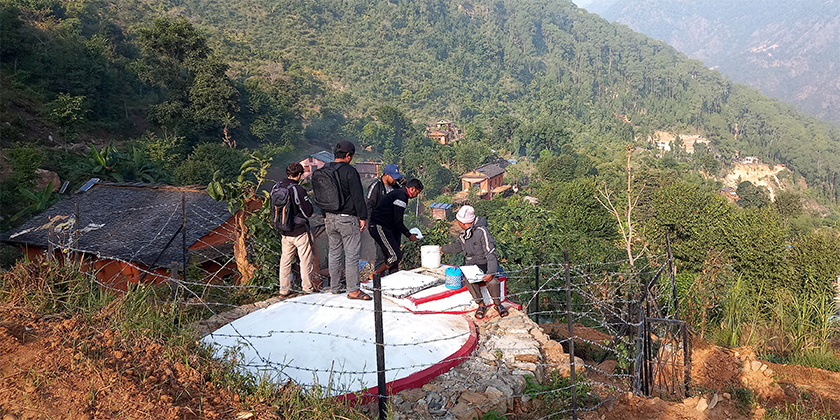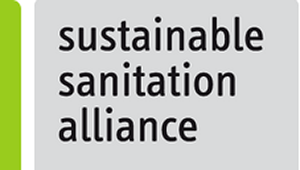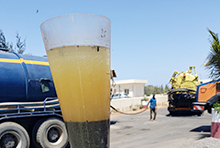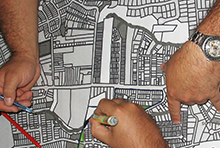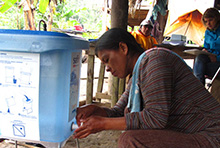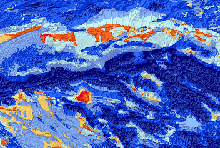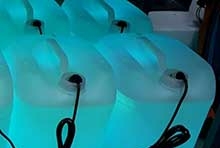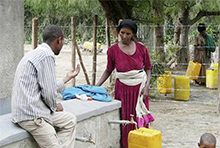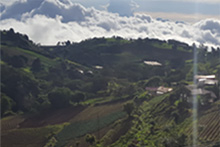Water and development

Safe drinking water and comprehensive sanitation
Access to safe drinking water and sanitation are important factors for people’s health and well-being. Hygiene is key to preventing illnesses, and the safe handling of faeces protects the environment. Eawag is therefore conducting research into methods of drinking water treatment as well as the improvement and optimisation of sanitation facilities and wastewater treatment plants.

Water and sanitation in the Global South
Water supply and wastewater disposal are particularly inadequate in countries of the Global South. This is partly due to climatic conditions, the rapid growth of urban regions as well as structural and economic influences. Eawag researches innovative, evidence-based methods and further develops best practices and technologies that improve access to sanitation and clean drinking water as well as solid waste management.
In doing so, Eawag focuses on international cooperation with universities, research institutions, government agencies and NGOs. The research institute promotes transdisciplinary partnerships with the public and private sectors at regional and national level and offers training and further education, workshops and blended learning programmes.
Pollutants in drinking water
In addition to sufficient quantities, quality is also crucial when it comes to the supply of drinking water. Besides supply issues, Eawag’s research also covers questions relating to environmental processes and the behaviour of chemical substances. What happens to our drinking water in the ground? Which organic pollutants and heavy metals can end up in drinking water? An understanding of bio- and geochemical processes is essential in order to guarantee the supply of clean drinking water. But also understanding and appropriate solutions with regard to pesticides or the contamination of arsenic and fluoride play a key role in the provision (and protection) of safe drinking water.


Social issues surrounding water
Drinking water and sanitation are issues that affect everyone. This makes it all the more important to know the social structures in the respective areas and to adapt appropriate measures accordingly. Our research is not only dedicated to the question of how social acceptance can be found for sustainable innovations and how behavioural changes can be achieved, but also how complex decisions can be improved or what roles politics and governance play in the water and environmental sector.
Wastewater treatment and processing
In countries of the Global South, sewage systems and wastewater treatment plants are usually only found in large urban areas. The rapidly growing areas on the periphery and remote regions often have no connection to a sewage system. Here, Eawag is researching decentralised systems to make the handling of urine and faeces safer and more sustainable. This protects groundwater and watercourses – and therefore drinking water – from pollution and in turn reduces the risk of disease for the population. At the same time, it offers the opportunity to recover resources. The cleaned water can be used for irrigation. In addition, processed urine and faeces can be reused as fertiliser or a source of energy.
Publications for practice
Research projects
Network
We work together with a wide variety of partners.
The SDC Water Network promotes knowledge management within the water sector worldwide.
SECO Urban development and infrastructure services: SECO is dedicated to promoting environmentally friendly urban development.

The Swiss Water Partnership (SWP) is a multi-stakeholder platform bringing together organisations from academia, civil society, public and private sectors.
The objective of the NADEL Center for Development and Cooperation at ETH Zurich is to inspire and train the next generation for global cooperation.
Scientific publications
Cover picture: A water kiosk in Uganda that uses a gravity-driven membrane to purify and then dispense water. The system was developed at Eawag (Maryna Peter, FHNW).











